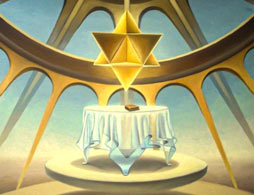Ritual

A ritual (ritualis) is a natural or structured order of cosmic, dimensional, or practical relations that place the person in a particular ceremonial relationship to others as well as to space. A ritual is a time-honored method of carrying out a process, a traditional performance of customs. It is an order established by someone or something.
A ritual is primarily a tried and tested method of interacting with space. Otherwise, it becomes a mystery. Therefore, anything to do with mediumship, irrationality, or magic, anything outside of orderly control, cannot be considered a ritual. It is rather a ceremony, a kind of ritual, or even a mystery. The ritual always implies order, discipline, and control. It has to do with tuning in and experiencing a process. A ritual enables those involved to become aware of the extent to which their consciousness is ready to participate.
The most difficult aspect to understand in a ritual is the under-representation of the sacrament, which leads to limited perception and development of an attitude towards it. The ritual is different from mystery; it involves multiple ceremonial constraints, and these differences are important as they relate to the formation of different states.
It is important to know that the rituals are different – from the ritual of greeting to the ritual of giving, to the ritual of casting out demons. Therefore, when it comes to ritual, one should not lump everything under one term. For ritual, it is the setting and the experience of the act that are important first, and only then the place, the form (the process), and the ceremonial (the appropriate clothing, attributes, signs, and symbols).
The setting is what unifies all kinds of rituals, even if they are of an irrational, mystical or magical nature, as long as they are led by a master, a shaman, or a teacher. In other words, it is important who or what attunes and initiates you into the ritual. Herein lies the main difficulty in becoming aware of ourselves and our own role in the process.
Of course, both internal and external conditions always have an impact. But we must realize that our lives are a combination of mysteries, ceremonies, and rituals that begin at birth and end when we leave this world.
It is important to be aware of how the ritual is presented to us and what our trained reactions or reflexes are that are presented to us in a ritual form. We can be so involved in the ritual through various rules and codes of conduct that we may not even be aware of our own reflex rituality. This happens, for example, when we accept or deny something based on a ritualization of concepts or relations not only to people but also to space and history. The ritual is not just a sequence, it is also an action, a behavior, thoughts, gestures, speech. The tradition or culture we adhere to is also a ritual.
The ritual has its own special characteristics that we need to understand. And that means entering a certain kind of reality, being initiated into a certain set of actions. A ritual should not be seen as bad or good, since in this case, we are superimposing one ritualization on another. It should be seen as something necessary or unnecessary. The most suitable example here is the ritual in martial arts. If we deprive the martial arts of ritualized relations, we will deprive them of moral and ethical norms, and they will simply become a method of developing aggression and discord. Another example is the ritualized greeting and discipline in yoga or with the Sufis as a means of organizing teaching, something more to do with the skill of teaching itself. The ability to respect knowledge is equivalent to developing in oneself a consistent attitude towards it, and this is already a ritual. Life is nothing without the discipline of action.
You may be asking yourself how it is that people get into situations of dependency by participating in rituals that they do not understand. Here it is more important to ask why they got into such a situation in the first place. And the answer is obvious: because many people seek shortcuts and fall into obedience to their own desires rather than the algorithm of controlled existence. And if a person knows how to do nothing and lives in indolence or subservience to his own desires, he ritualizes his own incompleteness or disordered existence without realizing it. Though this is more of a mystery than a ritual. Today in general the most common thing is ritualized mystery, the denial of all that people do not understand. And the ritual is precisely the means of making something close and familiar. A ritual is like a movement in a labyrinth, and it is the movement that is fundamental here. We understand not what we agree with, but what we direct the efforts of our minds upon in order to understand actions. Why? So that we can manage them. So having defined many other concepts, we come to the definition of the ability to understand.
The ritual is also very useful in helping us to learn to indulge in the activities or study of a subject at a particular time. Here comes the question of the quality of the training. Quality is invariably related to persistence. Because persistence leads to depth and depth leads to quality. The ritual helps us meet conscious actions and decisions, and understand them. If we are just stuck somewhere and get involved in something without being able to be ourselves, then we need to question the upbringing and development that have turned our lives into mechanical, formal functions that prevent us from understanding the nature of things.
In its highest manifestation, the ritual is a temple, a geometric construction necessary to sustain the light, to sustain the inner fire. It is an act of transformation based on the experience of the nature of light that finds expression in ritual contemplation, movement, sound, dance, etc.
The ritual is a process that leads to a state of inner openness, of awakening, to a state of special experience.
And if the mystery is a path to the reflection of light, then ritual is its embodiment. Ritual is the embodiment of light in the form of process. It gives form to the highest, totemic, or egregorous traditions. Ritual brings mysticism, mystery, order, and discipline to actions.
At the same time, the ritual is an expression of something conscious; it should not be confused with the rite. Therefore, we would say that the mystery is the reality of light, and the ritual sustains and develops it. Above all, the ritual requires the discipline of consciousness. We cannot touch the ritual; it is a set of actions in time. That is why we must understand the difference between mystery, ceremony, ritual, and rite.
15 November 2021







